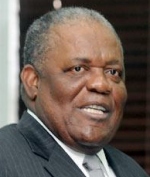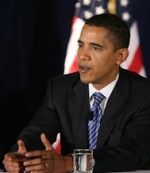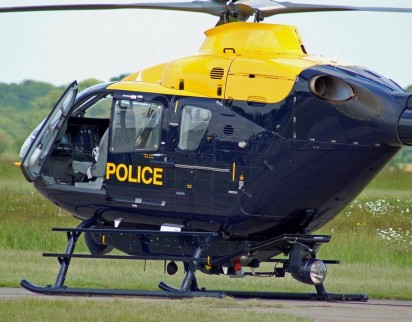Archive for October 11th, 2009

Climate change poses ‘serious threat’ to Bahamas
 (The Tribune): In his starkest warning yet about the danger that climate change poses for the Bahamas, Prime Minister Hubert Ingraham has told the international community that it is a “serious threat to our economic viability, social development and our territorial integrity.” Ahead of a critical conference when countries are to get what many are calling a “last chance to save the world” by creating a new pact to reverse the negative impacts of climate change, Mr Ingraham emphasised that if current trends continue some low-lying states — of which the Bahamas is one — “are set to become entirely uninhabitable.”
(The Tribune): In his starkest warning yet about the danger that climate change poses for the Bahamas, Prime Minister Hubert Ingraham has told the international community that it is a “serious threat to our economic viability, social development and our territorial integrity.” Ahead of a critical conference when countries are to get what many are calling a “last chance to save the world” by creating a new pact to reverse the negative impacts of climate change, Mr Ingraham emphasised that if current trends continue some low-lying states — of which the Bahamas is one — “are set to become entirely uninhabitable.”

God is not the Creator, claims academic
 (Telegraph): The notion of God as the Creator is wrong, claims a top academic, who believes the Bible has been wrongly translated for thousands of years. Professor Ellen van Wolde, a respected Old Testament scholar and author, claims the first sentence of Genesis "in the beginning God created the Heaven and the Earth" is not a true translation of the Hebrew. She claims she has carried out fresh textual analysis that suggests the writers of the great book never intended to suggest that God created the world — and in fact the Earth was already there when he created humans and animals.
(Telegraph): The notion of God as the Creator is wrong, claims a top academic, who believes the Bible has been wrongly translated for thousands of years. Professor Ellen van Wolde, a respected Old Testament scholar and author, claims the first sentence of Genesis "in the beginning God created the Heaven and the Earth" is not a true translation of the Hebrew. She claims she has carried out fresh textual analysis that suggests the writers of the great book never intended to suggest that God created the world — and in fact the Earth was already there when he created humans and animals.

Nobel honour stuns Obama – and the world
 (The Independent): A slightly sheepish President Barack Obama accepted the 2009 Nobel Peace Prize as a "call to action" to the whole world to confront the global challenges before it, ranging from climate change to the threat of nuclear proliferation. But he made no attempt to conceal his astonishment at being selected. Mr Obama used a Rose Garden appearance yesterday partly to deflect the attention from himself with humour and humility. "This is not how I expected to wake up this morning," he said, noting that his daughters were as quick to inform him it was also Bo the dog’s birthday. Children, he said, "keep things in perspective".
(The Independent): A slightly sheepish President Barack Obama accepted the 2009 Nobel Peace Prize as a "call to action" to the whole world to confront the global challenges before it, ranging from climate change to the threat of nuclear proliferation. But he made no attempt to conceal his astonishment at being selected. Mr Obama used a Rose Garden appearance yesterday partly to deflect the attention from himself with humour and humility. "This is not how I expected to wake up this morning," he said, noting that his daughters were as quick to inform him it was also Bo the dog’s birthday. Children, he said, "keep things in perspective".

Town bans bottled water
 (Independent): Plastic bottles were ceremoniously removed from shelves in the sleepy Australian town of Bundanoon at the weekend as a ban on commercially-bottled water – believed to be a world first – came into force. The ban, which is supported by local shopkeepers, means bottled water can no longer be bought in the town in the Southern Highlands, two hours from Sydney. Instead, reusable bottles have gone on sale, which can be refilled for free at new drinking fountains. Locals marched through the town on Saturday, led by a lone piper, to celebrate the start of the ban. The ban was triggered by a Sydney drinks company’s plan to build a water extraction plant in the town.
(Independent): Plastic bottles were ceremoniously removed from shelves in the sleepy Australian town of Bundanoon at the weekend as a ban on commercially-bottled water – believed to be a world first – came into force. The ban, which is supported by local shopkeepers, means bottled water can no longer be bought in the town in the Southern Highlands, two hours from Sydney. Instead, reusable bottles have gone on sale, which can be refilled for free at new drinking fountains. Locals marched through the town on Saturday, led by a lone piper, to celebrate the start of the ban. The ban was triggered by a Sydney drinks company’s plan to build a water extraction plant in the town.

Helicopter faces more delays
 (CNS): The goal of Cayman’s law enforcement agencies to benefit from their own helicopter in the fight against crime remains an elusive target as news came on Friday from Deputy Commissioner of Police Anthony Ennis that the machine will not be in Cayman before January 2010. Despite reassurances from Police Commissioner David Baines at a Public Accounts Committee meeting in August that the chopper would have been in Cayman by September, Ennis said there were further delays.
(CNS): The goal of Cayman’s law enforcement agencies to benefit from their own helicopter in the fight against crime remains an elusive target as news came on Friday from Deputy Commissioner of Police Anthony Ennis that the machine will not be in Cayman before January 2010. Despite reassurances from Police Commissioner David Baines at a Public Accounts Committee meeting in August that the chopper would have been in Cayman by September, Ennis said there were further delays.
Answering questions in the Legislative Assembly’s Finance Committee on this year’s operating expenses for the RCIPS on Friday, Anthony Ennis confirmed that the helicopter was still in the US and it would not be here until early next year. Deputy Chief Secretary Franz Manderson explained that there had been delays in the tendering process to find an organisation to maintain the helicopter and there was no point bringing it down to the islands until that contract was in place as the police would still not be able to use it.
The ongoing saga of the police helicopter began back at the beginning of the PPM’s administration when they increased the police budget significantly and made an extra $50 million commitment to help fight crime, which included the purchase of a police helicopter. However, as the process moved forward the needs of the police and the desires of the Cabinet about what the helicopter should do came into conflict. In September 2008 the government accused the former police commissioner, Stuart Kernohan, of misleading them about the purchase as the helicopter he bought from a former police service in the UK could not fill the requirement that government had asked for.
Kernohan, who was at the time suspended from office as a result of Operation Tempura and off-island, countered the accusations in a public statement saying government was fully aware about the capabilities and details of the helicopter that had been bought, and every day that the helicopter was delayed was a good day for the bad guys.
Auditor General Dan Duguay then conducted a special report on the machine’s purchase, which concluded that there certainly had been some mis-communication between police and Cabinet over the helicopter’s role, and he noted that the money allocated for it was nowhere near enough to cover a machine that could do both police work and search, rescue and emergency airlift. Duguay recommended that government asses the cost to modify the helicopter or cut its losses and sell the current helicopter and start over, but this time with a clearer understanding of what was needed.
Nine months later, however, Duguay stated at the August PAC meeting that he was dismayed that nothing had been done and the helicopter was still sitting in a hanger in Louisiana with a question mark over its future. However, when PAC heard from the new commissioner, he said it could work and that it was time to bring the machine over and start using it. Despite that promising development, it appears that the saga continues and Cayman remains dependent on the one ‘tour’ helicopter designed to take people on airborne excursions, for drug and firearms interdiction.
Bush entices business back with work-permits promise
(CNS): Offering to make it easier for firms in the financial services sector to recruit the staff they needed, Leader of Government Business McKeeva Bush told representatives from the fund industry on Friday that he would be reviewing Cayman’s immigration system and policies. Speaking at Cayman Fund Focus conference, sponsored by local law firm Campbells, Bush, who was the keynote lunchtime speaker, said he was going to do what he could to attract the staff that had been lost back to the Cayman Islands with changes to the immigration regime.
“I am well aware that there is a growing practice of outsourcing mid-office staff to other jurisdictions by some of our local firms,” Bush said, adding that it was the nature of our immigration regime which had contributed greatly to companies making that decision. “Our government wishes to do what is necessary to have those staff members relocated back to the Cayman Islands.”
The LoGB said that the people the industry employs contribute greatly to the local economy. He said that government would work hard to make sure Caymanians were trained and got employment in the fund industry but he knew that when a business faced increased demand for its services they need the ability to recruit in the most efficient manner the staff they need. "And that is what my government is going to help with,” he said.
Immigration was never easy to tackle, he observed, but his government intend to fix the problem so the fund industry could grow. “It is time for action in this area … changes will be made within the next few weeks which will make it easier for fund administrators and other financial services firms to recruit their staff members,” Bush added.
He suggested that, while it was a two-way street and the government needed the continued support from the sector to train and recruit Caymanians, he would deliver on his commitment to relieve the challenges the industry faced with staff to grow their business.
Starting this week, he said, he would be meeting with individual firms to better understand the decision to employ staff in other countries and work out the issues and to see there was the incentive to relocate staff, and by extension business.
He said he also wanted to work towards attracting fund mangers to Cayman as part of the overall strategy of developing Cayman into an International Business Centre, which would secure a more sustainable future and effect how the financial services industry was viewed internationally. “We need the assistance and feed back from this sector, specifically on how we can attract fund managers and other investment professionals to the Cayman Islands.”
He said that it was possible people in the audience may have believed that the government should have introduced a tax but he did not think so, and said he still felt the country could get what it needed by growing its financial business.
“Having the right immigration policy, support from government, building its people who have a presence here — that will give us the revenue,” he said.
Bush said that his people would benefit with better schools, roads and infrastructure and it was the thing to do.
He also spoke about other future plans with the private sector to help grow Cayman, and said that there were a significant number of projects that were in the pipeline that would give the economy a boost of up to $2 billion. Bush also said that he was in talks with an exclusive boutique hotel which was looking to make Cayman its third location.
“There is tremendous interest in the islands,” he said, and while the country faced challenges there were opportunities and it was his job to provide the policy support to benefit from direct investment.